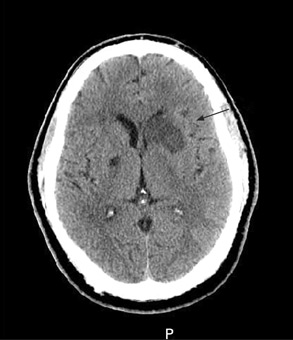Summary
Definition
History and exam
Key diagnostic factors
- unilateral weakness or paralysis in the face, arm or leg
- dysphasia
- ataxia
- visual disturbance
- risk factors
Other diagnostic factors
- sensory loss (numbness)
- dysarthria
- headache
- gaze paresis
- arrhythmias, murmurs, or pulmonary oedema
- vertigo
- nausea and/or vomiting
- neck or facial pain
- miosis, ptosis, and facial anhidrosis (hemilateral)
- decreased level of consciousness or coma
Risk factors
- older age
- family history of stroke
- history of ischaemic stroke or TIA
- hypertension
- smoking
- diabetes mellitus
- atrial fibrillation
- comorbid cardiac conditions
- carotid artery stenosis
- sickle cell disease
- dyslipidaemia
- lower levels of education
- black or South Asian ethnic groups
- poor diet and nutrition
- physical inactivity
- obesity
- alcohol abuse
- oestrogen-containing therapy
- obstructive sleep apnoea
- illicit drug use
- migraine
- hyperhomocysteinaemia
- elevated lipoprotein(a)
- hypercoagulable states
- elevated C-reactive protein
- aortic arch plaques
Diagnostic investigations
1st investigations to order
- non-contrast CT head
- serum glucose
- serum electrolytes
- serum urea and creatinine
- cardiac enzymes
- FBC
- ECG
- prothrombin time and PTT (with INR)
Investigations to consider
- serum toxicology screen
- MRI head
- CT angiography
- CT or MRI perfusion-weighted imaging
- carotid ultrasound
- echocardiogram
Treatment algorithm
Contributors
Expert advisers
Matthew Jones, MD, FRCP
Consultant Neurologist
Manchester Centre for Clinical Neurosciences
Northern Care Alliance
Honorary Senior Lecturer
University of Manchester
Manchester
UK
Disclosures
MJ is the chair of the Association of British Neurologists Education Committee (unpaid position). MJ is a faculty member of an MRCP revision course. MJ has received honoraria from Eisai for educational talks.
Rachael Power, MBChB, MRCP
Neurology Registrar
Manchester Centre for Clinical Neurosciences
Manchester
UK
Disclosures
RP has been sponsored by Novartis to attend the International Headache Conference.
Acknowledgements
BMJ Best Practice would like to gratefully acknowledge the previous expert contributor for this topic, whose work has been retained in parts of the content:
George Ntaios, MD, MSc (ESO Stroke Medicine), PhD, FESO
Assistant Professor of Internal Medicine
Medical School
University of Thessaly
Greece
Disclosures
GN is on the advisory boards for, and has received honoraria, speaker fees, and research support from: Amgen, Bayer, Boehringer-Ingelheim, BMS/Pfizer, Elpen, Galenica, Medtronic, Sanofi, and Winmedica.
Peer reviewers
Kayvan Khadjooi, MD, FRCP, PGCertMedEd
Consultant in Stroke Medicine
Addenbrooke’s Hospital
Associate Lecturer
School of Clinical Medicine
University of Cambridge
Cambridge
UK
Disclosures
KK has received travel grants for conferences/speaker honoraria from Bayer, Boehringer, Daiichi-Sankyo, Pfizer, and Shire.
Use of this content is subject to our disclaimer
